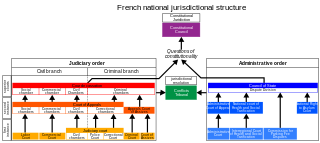
Fair use is a doctrine in United States law that permits limited use of copyrighted material without having to first acquire permission from the copyright holder. Fair use is one of the limitations to copyright intended to balance the interests of copyright holders with the public interest in the wider distribution and use of creative works by allowing as a defense to copyright infringement claims certain limited uses that might otherwise be considered infringement. The US "fair use doctrine" is generally broader than the "fair dealing" rights known in most countries that inherited English Common Law. The fair use right is a general exception, that applies to all different kinds of uses with all types of works. In the U.S., fair use right/exception is based on a flexible proportionality test, that examines the purpose of the use, the amount used, and the impact on the market of the original work.

Open-source licenses are software licenses that allow content to be used, modified, and shared. They facilitate free and open-source software (FOSS) development. Intellectual property (IP) laws restrict the modification and sharing of creative works. Free and open-source licenses use these existing legal structures for an inverse purpose. They grant the recipient the rights to use the software, examine the source code, modify it, and distribute the modifications. These criteria are outlined in the Open Source Definition.

English law is the common law legal system of England and Wales, comprising mainly criminal law and civil law, each branch having its own courts and procedures.
Commercial law – body of law that governs business and commercial transactions. It is often considered to be a branch of civil law and deals with issues of both private law and public law. It is also called business law.

The law of Japan refers to the legal system in Japan, which is primarily based on legal codes and statutes, with precedents also playing an important role. Japan has a civil law legal system with six legal codes, which were greatly influenced by Germany, to a lesser extent by France, and also adapted to Japanese circumstances. The Japanese Constitution enacted after World War II is the supreme law in Japan. An independent judiciary has the power to review laws and government acts for constitutionality.

Civil law is a legal system originating in Italy and France and adopted in much of the world. The civil law system is intellectualized within the framework of Roman law and French civil law, and with core principles codified into a referable system, which serves as the primary source of law. The civil law system is often contrasted with the common law system, which originated in medieval England. Whereas the civil law takes the form of legal codes, the common law comes from uncodified case law that arises as a result of judicial decisions, recognising prior court decisions as legally binding precedent.

Macau law is broadly based on Portuguese law, and therefore part of the civil law tradition of continental European legal systems. Portuguese law is itself highly influenced by German law. However, many other influences are present, including Chinese law, Italian law, and some narrow aspects of common law.

In Poland, any person holding a Magister's degree in law is called a "jurist" or "lawyer". According to Polish legal doctrine, a lawyer should be understood as a person who graduated from law school with the aforementioned degree, even if such a person does not practice law after graduation.

French law has a dual jurisdictional system comprising private law, also known as judicial law, and public law.
The law of Germany, that being the modern German legal system, is a system of civil law which is founded on the principles laid out by the Basic Law for the Federal Republic of Germany, though many of the most important laws, for example most regulations of the civil code were developed prior to the 1949 constitution. It is composed of public law, which regulates the relations between a citizen/person and the state or two bodies of the state, and the private law, (Privatrecht) which regulates the relations between two people or companies. It has been subject to a wide array of influences from Roman law, such as the Justinian Code the Corpus Juris Civilis, and a to a lesser extent the Napoleonic Code.

Faculty of Law and Administration is the oldest unit of the Jagiellonian University. In 1364, when the University was established, 8 out of 11 chairs were devoted to legal sciences. At the beginning only courses in Canon Law and Roman Law were available. At present, the faculty is recognised as the best law faculty in Poland with the best bar passage rates and one of the finest in Central Europe.

The intellectual property rights on photographs are protected in different jurisdictions by the laws governing copyright and moral rights. In some cases photography may be restricted by civil or criminal law. Publishing certain photographs can be restricted by privacy or other laws. Photography can be generally restricted in the interests of public morality and the protection of children.
The legal system of Ukraine is based on civil law, and belongs to the Romano-Germanic legal tradition. The main source of legal information is codified law. Customary law and case law are not as common, though case law is often used in support of the written law, as in many other legal systems. Historically, the Ukrainian legal system is primarily influenced by the French civil code, Roman Law, and traditional Ukrainian customary law. The new civil law books were heavily influenced by the German Bürgerliches Gesetzbuch.

Copyright infringement is the use of works protected by copyright without permission for a usage where such permission is required, thereby infringing certain exclusive rights granted to the copyright holder, such as the right to reproduce, distribute, display or perform the protected work, or to make derivative works. The copyright holder is typically the work's creator, or a publisher or other business to whom copyright has been assigned. Copyright holders routinely invoke legal and technological measures to prevent and penalize copyright infringement.

Law is a set of rules that are created and are enforceable by social or governmental institutions to regulate behavior, with its precise definition a matter of longstanding debate. It has been variously described as a science and as the art of justice. State-enforced laws can be made by a group legislature or by a single legislator, resulting in statutes; by the executive through decrees and regulations; or established by judges through precedent, usually in common law jurisdictions. Private individuals may create legally binding contracts, including arbitration agreements that adopt alternative ways of resolving disputes to standard court litigation. The creation of laws themselves may be influenced by a constitution, written or tacit, and the rights encoded therein. The law shapes politics, economics, history and society in various ways and also serves as a mediator of relations between people.
A contract is an agreement that specifies certain legally enforceable rights and obligations pertaining to two or more parties. A contract typically involves the transfer of goods, services, money, or a promise to transfer any of those at a future date, and the activities and intentions of the parties entering into a contract may be referred to as contracting. In the event of a breach of contract, the injured party may seek judicial remedies such as damages or equitable remedies such as specific performance or rescission. A binding agreement between actors in international law is known as a treaty.
The laws of Thailand are based on the civil law, but have been influenced by common law.
The judiciary of Poland are the authorities exercising the judicial power of the Polish state on the basis of Chapter 8 of the Constitution of Poland. As in almost all countries of continental Europe, the Polish judiciary operates within the framework of civil law.

Piotr Waglowski, known online as VaGla, is a Polish lawyer, poet, publicist and webmaster, open government activist, researcher of communication processes in the paradigm of social constructionism.
Divorce in Poland occurs at a rate slightly below that of the average for Europe. In the Polish legal system, divorce proceedings fall within the exclusive jurisdiction of the civil court; there is no legal basis for resolving a marriage through the agreement of the spouses or through administrative procedures. Divorce requests are assessed by the court, in accordance with the positive and negative prerequisites set in the relevant law.














